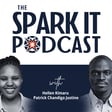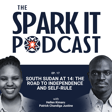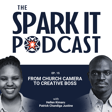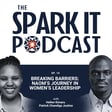Become a Creator today!Start creating today - Share your story with the world!
Start for free
00:00:00
00:00:01

Finding Our Voices Through Art
In this episode, Hellen Kimaru speaks with her sisters, Lydia and Ann, about growing up with poetry, acting, and music. Lydia is a fashion designer, YouTuber, and mom who has loved theater from a young age. She now supports her son’s music and poetry. Ann discovered poetry at age nine and once performed for Kenya’s First Lady, Lucy Kibaki. Together, they share how art helped them gain confidence, heal from trauma, make new friends, and learn public speaking. They also talk about how their mother’s support helped them perform in church, weddings, and school, teaching them valuable lessons in leadership and teamwork. Now, they are passing on their love of art to the next generation. Enjoy their inspiring stories!
Transcript
Introduction and Guest Welcome
00:00:00
Speaker
Welcome to the Spark It podcast with me, Kimaru. And today I'm super excited, honestly, to be hosting our guests. They're very brilliant women, women I actually grew up with.
00:00:11
Speaker
I'm proud to call them my sisters.
00:00:16
Speaker
Yeah, and honestly, ah today I wanted us to focus on ah on the topic of finding our voices and how art shaped our childhood and also part our adulthood, honestly, even now, actually.
00:00:31
Speaker
Yes, so that's what we'll be talking about. I'm super excited to actually host them. Thank you guys for gracing us here at the Spark It podcast. And i would love for you guys to sort of introduce yourselves, you know.
00:00:43
Speaker
So we will start to with you. Hi guys. Um, I'm excited to be here. Thank you so much for hosting us. Um, my name is Lydia or you can call me Likia.
00:00:54
Speaker
I'm a fashion designer. Um, I'm a and I'm a mom. Wow. hello but This is interesting.
00:01:08
Speaker
Uh huh. It's your turn. but Oh, Hey guys. My name is Anne and I'm excited to be here. Yeah. Oh, okay. Impressive. So, ah so I'd like to ask you guys, remember, we growing up, we were this very artistic family. I think all of us were sort of gifted in similar ways and also differently in our own ways.
00:01:31
Speaker
Could you probably guys talk about your experiences and how that looked like for you when we were younger?
Art and Childhood Experiences
00:01:40
Speaker
Maybe we could start with you, Kimzee. Okay. When it comes to art personally, ah for me, um growing up, i was I used to perform with different type of arts. I used to do plays. That is theater play. I used to do poetry.
00:01:57
Speaker
I used to do... um narratives and I also used to do choral verse as a team and i was the lead soloist for folk song or traditional dance yeah so that was amazing so having to been able to do all these ah the same time of having to be able to able to work around art in different forms was amazing for me as a child. Growing up, it it was one of the major things that was filling my life or making life giving life a meaning to me.
00:02:32
Speaker
Wow, that's really exciting. And what about you, Ani? oh ah started doing poetry when I was like nine. yeah That is solo verses, the choral verses, both at school and in church.
00:02:49
Speaker
And it really helped me. yeah It felt good. It was a great thing to do as a kid and even as a teenager.
00:03:00
Speaker
And it really helped a lot in making friends and Yeah, that's all. Interesting. I think they are not giving you all the details. Okay, so anyway, but could you guys maybe give us like one experience during that time when you are sort of very much engaged with this art?
00:03:21
Speaker
Like what's that one specific experience that sort of like really shaped you either your love for art or how you viewed art? Yeah, something like that.
00:03:33
Speaker
So ah for me, there's this one specific narrative that I did. we used to we if We used to call it Setulungo. So it was ah major, major piece that made me ah fall in love with art because, guys, I was in a municipal school or...
00:03:50
Speaker
yeah so having to compete in big platforms uh having to compete with big schools well-known schools and emerging the winner having to hold the trophy in front of these major schools you know those schools that are known for these yeah like every year after year they're the ones who are carrying the trophy home or you know so having to perform that and moving from different levels and still being the winner that really really gave me the you know the confidence to go out and then the love for art i fell in love with that and because for me at when i was young i feel like art was a way of personally expressing myself and being seen yeah so having to be seen in all those
00:04:35
Speaker
platforms by all those people, like having that piece being the major piece, actually it was even in a magazine, having to have that as the bigger piece um or a nut that gave me the platform to express myself, becoming the winner in those small, big, meja major theatres.
00:04:54
Speaker
that was amazing that was amazing in a magazine yeah in a gazette yes with kajimi i was tall and then jimmy was you know we did um we had that i was super tall and then the person who we were narrating with was kind of a short a short man so that i guess that was one of the major things that made made us even stand out in those many you know because Yeah.
00:05:17
Speaker
Wow. But it was interesting. was great. That must have been Situlungu. Yeah, Situlungu, yes. Situlungu was a short man. Yeah, Situlungu was a big... Situlungu was a small boy. And his head... And his head was too big. Yo, was... That was nice.
00:05:33
Speaker
Wow. And it also had, like, it's that's that art, that piece had um music in it, yeah? So we were performing... Mm-hmm.
00:05:44
Speaker
the the narrative itself, giving a story and then bringing in the traditional dance in. and low It was a whole thing. and ah wow What about you? What was that like very specific moment that defined what poetry or art looked like for you?
Family Support and Artistic Growth
00:06:02
Speaker
As for me, this this one time i was like, I was ah just a little girl. I was like nine years in grade three, probably. And ah I performed a solo verse in front of Lucy Kibaki.
00:06:21
Speaker
And the deputy president was Mudiawori. Yeah. no Yeah, I was a brownie and... Yeah, the girl guide teacher saw the potential in me and she gave me this poem, or rather Ashairi, which I memorized and performed in front of them.
00:06:42
Speaker
Yeah, that was great and it felt really really nice. And from there, I was able to continue performing until probably when I was in high school, yeah.
00:06:53
Speaker
And in regards to that share of yours, you also was featured in a magazine that my mom was out of date. Yeah, a newspaper, yeah. My mom has that newspaper. She has a newspaper now? Yeah, she does. She does?
00:07:04
Speaker
Yeah, she does. I don't know. I don't know about that. She'll go hang there, she'll copy and laminate. She'll go back her arm out. She has it. It's supposed to be mine. ah right I You should ask for it. Get a photocopy, laminate, and put like in a frame in your house. where Oh, yeah. I know. Keepsake. That's really nice. So what what do you guys, um what what do you think was the role of poetry for you in terms of how did it shape your leadership skills or something like that?
00:07:38
Speaker
Like how did that look like for you? Um, For me, it was a confidence builder because
Art as Therapy and Personal Development
00:07:47
Speaker
the esteem, the confidence that I had on stage and even associating or interacting with people, the confidence from the shairies and the performing so in front of so many people in a very major or mega hall.
00:08:02
Speaker
A lot of people, different ages, different status and everything. Everyone is looking at you. So it it was a way for me to build confidence. uh for me personally yeah i also found it easy for me to be able to speak in front of people be able to be confident in front of people like express myself in different ways because you're given a poem just for you to go ahead memorize and everything but now how you're going to perform it's up to you so you'll be led on how are you're supposed to perform but now acing that is up to you so you have to bring out the emotions or the
00:08:37
Speaker
you know, you'll have to be, let it come from inside. yeah Yeah. So I felt like it was a very good way to express myself. Yeah. Did you, did it eventually lead you to sort of doing any leadership roles at school?
00:08:52
Speaker
Oh yeah. Yeah. Yeah. It did because, uh, at that age, when I was in, in, uh, primary school, I was a commandant in Galgate. So i used to lead, um, I was a commandant in Galgate, actually a municipal one because they,
00:09:06
Speaker
I used to command until a certain incident called parade. So I used to command. um and yeah So like having to lead a lot of people different places was amazing.
00:09:21
Speaker
Also um doing art also gave me the... like as um as i said i started with poetry then folk song then later on i used to do plays and then i started now writing and directing that was the major the major like i i wrote an entire play and directed it Until the finals, like they went to the finals where we had a camp, a major camp to perform.
00:09:47
Speaker
And then during that, my main role play, or what are they called? My main cast, she wasn't feeling well. Then I had to fit in her shoes and do that play. So that was amazing. I felt like, you know, being a director at a young at a young age. How old were you? that was I was like, for that one, I was in...
00:10:07
Speaker
were you in high school primary school? my my last year class 8 my last year of class 8 yeah my last year of primary school yeah oh my god and you're already a producer director know know now look at you you need to jump into your talents right yeah definitely yeah I should I should I should go back to that oh wow and for you As for me, it built the confidence. and Later in high school, I was a class representative.
00:10:38
Speaker
yeah All through high school, from Form 1 to Form 4, it surely helps. yeah Standing in a crowd and addressing you know and commanding. like You could tell the class, oh please, guys, do this and this and this. People are able to listen to you.
00:10:57
Speaker
yeah that was good and it really helped wow so what i'm hearing from you guys it's like it built yeah it built your confidence public speaking skills leadership you ended up being prefect others are commanders Oh, my God, this is amazing. I think for me, what I would say, because now I also did this poetry. um I did poetry from, I think, also when I was around eight or nine.
00:11:27
Speaker
And it actually, i still do poetry to date. Yes, yes, yes. ah For me, would also say the same thing. it build It built me as a child. I felt seen ah good commander stage.
00:11:39
Speaker
I would embody like the poem, become it, release all the emotions, you know, and standing in front of a crowd convincing like judges like you're the it. Right. and they select you and you win. yeah I think for me, it sort of really also defined like even my sort of my personality at some point.
00:11:59
Speaker
Because I remember even in high school, I never wanted to miss out. I actually attended all the Kenya music festivals like all of them up to form four, regardless of whether the school had agreed from fours should actually do it or not. Yeah, they never actually used to allow it, but I did. But for me, just the same as you guys, it built my confidence, my self-esteem, my public speaking, you know, and, you know, and it felt nice to also be able to, you know, become a poem.
00:12:30
Speaker
Yeah. you know Wow, that's that's that's interesting. but they could Do you guys remember um that time at church? Because I think for us, at we did at at church and at school. Do you remember that particular saturday of Sunday we missed church and how furious the teachers were?
00:12:51
Speaker
What were they asking, mom? if to chacan is translated to if to do i put it if to let her canisa yeah did you stop did you leave the church or what's not happening are we okay actually they're thinking and is everything okay at home is everything okay because ah from from what i know or we are one two three four five like five of us were performing at church
Artistic Identity and Overcoming Challenges
00:13:23
Speaker
at the same time. yeah
00:13:24
Speaker
Imagine five kids from the same household, of the same family, both of you missing church, and you're the ones that the church will know, like, Unona, come on, like that time where maybe Sunday school, come come in, up do a ah piece for us, perform for us.
00:13:42
Speaker
you'll see Elena starting, twa ingi, twa ingi, like she's the one lead one leading. yeah So you can imagine at one Sunday and everyone is looking, they can't see the Kimaru's family. Everyone is just peeping and know it which was really, really concerning. and And our mom is there. So everyone was asking, hey, what to talk?
00:14:00
Speaker
Where are the children? Where are the kids? yeah Is everything okay at home? you know And then I remember like after that, all the other Sundays, my mom would be there like the first one to wake us up on a Sunday. She's like, hey, please get ready. do You need to go.
00:14:12
Speaker
We need to go to church. Yeah, true. I know, I know. never but After that, we never missed church, even a single day. Ah, interesting. And also maybe another thing is how did also, like the fact that we always were always at the top of with everything, if there's a drama happening at church or at school, you're chosen for the main roles, how did like that build you up?
00:14:34
Speaker
Like how did that feel to be selected as either you're the one representing or you're the one holding this very major role in a drama as kit? How did that feel for you guys?
00:14:46
Speaker
So from, um I believe if you've been watching this episode, you know, yeah this vi podcast, there's a story that she narrated. What episode is it? I think it was like the second episode, the one rising from ashes. Yes, rising from ashes. Yeah. So that put that episode has a backstory for us. Yeah.
00:15:03
Speaker
So using that backstory for me, now having to be in church or in school and being selected, it made me feel seen, made me feel like very important. it It was a way for me to fit in.
00:15:16
Speaker
And like just knowing that there are people there who are, the they can see you. They can think like It was amazing. For me, it was easier it was an easy way for me to be to get together with people and also ah now fit in in that car. Because we we had different class. class year so have it it It was a way for me to fit in and feel important. i was feeling really, really important because...
00:15:45
Speaker
There's someone who can recognize me. I know I'm important in my own skill. There's something that I'm able to offer as much as than there's nothing else I can offer. This is one thing, the art in me, I'm able to offer and people will appreciate. That was great.
00:16:00
Speaker
That made me feel safe. As for me, it was a boost to my self-esteem. Right. And it really made me make friends and it really felt at home.
00:16:15
Speaker
Right. Yeah. Being able to be chosen. Like I can say that. the people around me can see the potential in me. And I was a quite ah quiet, quiet girl, child. Yeah. charlie So it was really, it really helped with making friends and helping me express myself.
00:16:35
Speaker
Wow. Yeah. That's very nice. Okay. Now maybe to go back to what Kim just was trying to say, we did go through like a traumatic experience. How do you think like art helped you?
00:16:47
Speaker
either process the emotions or you know just navigate through life with regards to that particular experience so now that I'm a grown-up I can at that time it helped me get through a lot and so what I can tell I can name at the moment as therapy yeah so for me it was an an easy way to um out shadow or all the other things or just forget my pain for a moment, just forget my trauma for a moment. And having to, like, a given you're given a poem that is very, very emotional, something that you can relate to, something that, you know, so when you're on on that stage, when you're trying to perform the art or the poem itself, you're letting out the pain, the emotions, the feelings, the trauma. So people will be like, oh my gosh, she's, she's
00:17:41
Speaker
ah really really performing it yeah and you'll win a trophy because george you have performed it but when it comes to you deep down you already know like this line is really really really cutting deep, you know?
00:17:56
Speaker
So I feel like for me, it was a ah type of therapy. And also i used, I used art at that time to run away from a lot. I used it to run away from a lot. terre escape It was like an escape for me. Yeah. And that's why I couldn't miss,
00:18:11
Speaker
any If there's choral verse, I'm there. If there's drama, I'm there. If there's solo verse, I'm there. Like I was performing, I could perform five pieces at the same event, you know, and I could make sure that I'm acing them, all of them, because again, as I've told you, it was a way for me. It was...
00:18:29
Speaker
You know, having to to go home sleep and then the next day you're just practicing the entire day. it's That is like 18 hours or 16 hours of you not thinking about anything yeah your situation. Yeah, so it was an escape for me.
00:18:43
Speaker
Makes sense. And you? ah For me, since it was really engaging and I could be able to mingle with different people, different kids from different backgrounds, it really helped.
00:18:57
Speaker
yeah yeah You could always forget, like I had friends, I really have good friends until now since my childhood. We could go from church, go to their place yeah a yeah as we continue rehearsing. And you see, so that's really helped because no one could see your background.
00:19:20
Speaker
They could really see the you. Yeah, they could see the talent, right? Oh yeah. So that's it for me. yeah its by the No, that's actually very true. Because I think at church, we were so exceptional that at the end of the day, people could not see like the challenges we had. It became more of the talent that we bring to the table. big family. Yeah. Like you're there, you can you can lead a folk song, you can do a poem, you can act in a drama, you can write a whole you know script. Mm-hmm.
00:19:54
Speaker
Like direct other children to actually do it. And I remember actually speaking of the ah poetry becoming sort of an escape. I remember there is this poem. Remember the way Food is little.
00:20:06
Speaker
Children crying. mother to nurse. Brothers. Mothers. Mothers. No men in the villages. All are gone. Gone for days without an end. Fire. No, there was like morning songs I had from afar.
00:20:21
Speaker
Weeping is hard too. Women are crying for their children. ah love what? ah Something like that. yeah For the lost gun song. I
Expressing Emotions Through Poetry
00:20:30
Speaker
know. Fire. Fire. Houses are on fire.
00:20:34
Speaker
What has caused it? We wonder. They came at night. We were too weak to wake up. They stole our food from the stores. They have burnt everything. We carried our belongings, running for our dear lives.
00:20:47
Speaker
No place to go. Screams, shouts, fear. That was a major one. And telling it? Yes, that was actually...
00:20:58
Speaker
That was exactly what you were saying. So for me, this particular poem, this was my very, very first poem. And the first time I was set out on a stage to actually act out a poem him or something like that.
00:21:10
Speaker
And I remember we were rehearsing this poem, because as you guys said, the teacher who was our teacher at school was the same teacher at church. So she knew our talent. And she particularly chose me. And I feel like also it's because she sort of knew our story.
00:21:26
Speaker
Yeah, like what we had gone through. And this poem, I can't even tell you who wrote it and what was the intention behind it. But at this point, if you have reason listened sorry ah if you haveve listened to our podcast on Rising from Ashes, it sort of ah embodied like what we had gone through. Good experts. the whole experience and i remember this teacher telling me like hey tap into your emotions remember your story and as Kimzy was saying at the end of the day I ended crying ended up crying a lot in that poem when I was performing it on stage and that's how I actually won the category because for me it was sort of you're reflecting on things you've already
00:22:08
Speaker
gone through. It's like literally your personal experience. So when you're channeling these emotions, it's a story you're telling. So maybe the people who are seated on the other side of the stage, they probably think like, oh my God, this kid can actually... I know! Like she can literally become the poem.
00:22:27
Speaker
So for me, I would say also poetry became an escape as she said. Because, and also, you know, you go through it, you do it, and eventually it's like, yeah... Wow. Interesting.
00:22:39
Speaker
Yeah. So for me, yeah that, that, that for me, I would say was also how I i found a way to navigate. it It also became like therapy. Yeah. Poetry became like therapy for all of us. Right.
00:22:52
Speaker
Sure. Yeah. so in way app and I feel like it's just like that until now. because ah For me personally, um when I write, there's a way I know when I'm going through something, there's a way I'll go ahead and write.
00:23:06
Speaker
Write something, just scribble some words to put my emotions together in in a piece of paper and then feel... you know, feel relieved. or like Like those days when you perform that, you'll cry and cry and cry. And then when you come out of that stage, you get a trophy, you forget for a minute. You forget that or the whole thing. So I feel like that is therapy until now. It's working for me
Mother's Influence and Family Collaborations
00:23:29
Speaker
personally.
00:23:29
Speaker
Wow. That's true. So maybe as we wind up, what do you think was the role of mom in us like sort of becoming who we became, with the support she sort of offered? Mm-hmm.
00:23:41
Speaker
Like for you, what would you say? What role did she play in your artistic journey? She really played a great role. She saw the potential in us and as she pushed us.
00:23:51
Speaker
yeah She was like, go to church, perform, you give in these, memorize this, do this, this. She really impacted us greatly.
00:24:03
Speaker
yeah She was a very great support system. And you? Yeah, my mom is the gods. a That woman, she did a lot. And then the fact that she's also into art, or she was also into art.
00:24:17
Speaker
Actually, she is until now. yeah Because even when it comes to the women at church, she also used to act and do the muhowaa the folk songs, you know, those traditional dances. She used to do that. yeah So having to watch her perform and do that, it felt like, yo it's oh, so this is...
00:24:36
Speaker
It runs in the family, so if my mom can do this, why not me? And then her pushing us, making sure that we perform. Like for her, there's this poem that we always do for weddings. there for her She used to make sure that we performed in every single wedding that came through.
00:24:52
Speaker
Every single. as long as there's a wedding mentioned she'll be like you guys are performing you guys are performing and we had ah we had no choice but to just because it's not something that we'll say no to she has already stated that you're going to do it and then her pushing you it felt like oh and also she had a way of appreciating us because as i mentioned for those um those folk songs and then preparing for those art pieces she made sure that she was present like she could be with us the whole night trying to ah create those costumes do the accessory traditional accessories she made sure that she was present and made sure that her presence was known because you could be singing a folk song or the traditional dance with a skirt that your mom made it was amazing she burnt the whole night with you guys trying to prepare that
00:25:41
Speaker
And speaking of actually the the sort of help that we got from her, I remember also she was the one person who at some point when you guys, I think I had left for high school, you guys started doing like poems and people would pay you. How was that experience for you?
00:25:55
Speaker
And the fact that she was the one even looking out for you guys in terms of finding these opportunities and stuff like that, maybe Anne could probably tell us how like they ended up actually getting paid to perform. She was our personal manager.
00:26:10
Speaker
I know. and There was this shairi we were saying, we were narrating in weddings. So mom used to like, we went to one for a wedding and they like, oh, you're doing good. This is perfect. And they'll just give us a token of appreciation. And this this went on for a while.
00:26:35
Speaker
So we could be called for most weddings in our church in different places so if you perform in this during this wedding the next person to see you will be like oh that was a great performance during my wedding you'll come so we just used to change the names of the bride and the groom yeah and we just go perform so we used to go to a lot of weddings yeah and they pay us I know. The performance. yeah And just to mention actually that poem was also written by one of our older sisters. sheing Yeah.
Passing on the Artistic Legacy
00:27:09
Speaker
So it's amazing. like yeah
00:27:11
Speaker
We did capitalize on it. and We did capitalize on it as a family because now imagine it's a poem written by your sister and then you guys are performing and getting to make money out of it. As I said, my mom was a personal manager because she was like, you're going to that wedding?
00:27:27
Speaker
Good job. You did a great job. They invited us. Yeah. And now refusing. yeah Yeah, and she believed in us because we used to even leave town. And she'd be like, you guys be good girls and boys. Just go. She will just release us. We go perform and then come back. And it was amazing when you come back with the token and she'll be like, oh, nice. That was great. You did great. It felt so good. she But then she knows how to appreciate us in so many ways.
00:27:50
Speaker
So maybe one other question. Now that we see the role like mom played in our lives. And now for you, Kimzi, you said you're a mom. And you have a wonderful son. Oh, thank you. so I know he's the best. Yeah. So what what do you think the last the the other day when you guys called, he was on call and he's like, oh, I want to say a poem for you, auntie. I'm like, yeah, please go ahead. How do you think also so the childhood kind of what what you went through?
00:28:18
Speaker
How did it shape you to become now the mother you are now in terms of sort of also molding your baby to becoming, I mean, you in terms of art? Because now he's performing, he's playing music, he's doing poetry.
00:28:31
Speaker
How has that looked like for you? ah For me, having to to watch him grow up and loving art is amazing. It's not something that I taught him personally. It's something like he he just brought it out. Yeah, he picked it out from different... I don't know it's whether it's me or...
00:28:50
Speaker
I don't know, but I used to play him things that we do or I used to, you know, there's this poem, there's a hole in my bucket. Dear mama, dear mama, there's a hole in my, yeah, I used to play that for him. So when he joined school, he's actually turning five, yeah? So when he joined school, this time, he just, he was like, mama, no, he told me last time that he wants to join music.
00:29:12
Speaker
and i was like yeah sure you can go ahead and join music so uh on his fourth birthday he requested me to get him a guitar and i was like um so i bought him a guitar just to because he requested for it yeah but i didn't know that it was a way for me to make sure for him to know it was a way for him to express so the next thing that he had he requested for was the decoder recorder yeah is it yeah record that he told me he wants a zailo Yeah, so he asked for a recorder. I gave him so school that training that but now when it came to that poem, it was a surprise to me because he did a poem ah with his classmates.
00:29:48
Speaker
They went and performed. They won a trophy and it was exciting to him. It felt so great. So for me seeing him that happy and knowing that he's falling in love with um at not because I've forced him but it's coming from within.
00:30:02
Speaker
It feels great. It feels great. That is amazing. So I can't wait to see him grow and being a mini me performing. I'm going to tap into that. I'm going to make sure just the way my mama gave me support, I'm going to support him in all ways because i can't, for me, I didn't go to theater later in life, but i I wouldn't mind to see him in a movie or in a, you know,
00:30:24
Speaker
Yeah, so I'll keep on pushing him towards that. Interesting. Wow. What about you, Nje? What do you think in future, once you get kids, for example, what do you think you would do for them as far as art is concerned now that it shaped your childhood?
00:30:40
Speaker
As for me, if I identify the potential in my kid, I'll just give them my full support. Yeah, show them to navigate here and there and provide for them whatever they need so that they can be able to achieve their goal.
Conclusion and Reflections
00:30:58
Speaker
Yeah. wow that's amazing wow that's that's very interesting thank you guys for honestly showing up and giving us your side of the story thank you it's easy to tell people like oh i come from an artistic family but when people hear it from you guys i believe they can actually understand what i mean by saying i come from an artistic family So I do feel like art for us was, it gave us confidence.
00:31:28
Speaker
It gave us a platform to express ourselves. It taught leadership skills. It, you know, we became good public speakers because of art. It taught us how to network. As Nja said, she made like a lot of friends because you she was doing poetry. It healed us.
00:31:45
Speaker
It's still healing us through ah maybe the things we've gone through life. That's like sort of what I would summarize this episode you know for you guys. and maybe Do you have like any last words before we wind up?
00:32:01
Speaker
I don't think so, but thank you for hosting us. Thank you for showing up. It has been great. Thank you so much for hosting us. We appreciate Patrick, I can't wait to have you on the next episode. you know Definitely. Patrick is missing out uh yeah but thank you guys for showing up we appreciate you guys and yeah to our listeners and our viewers thank you for watching this packet podcast and also for supporting us on all our social media platforms catch our next episode ah
00:32:35
Speaker
on all podcasting platforms and on YouTube. And yes, thank you so much. If this episode has sparked some interest for you, you can share it to your loved ones and keep it at the Spark It podcast.
00:32:50
Speaker
Thank you and bye. Bye-bye. It's Spark It. see


















